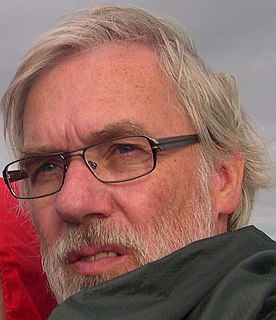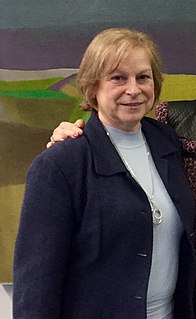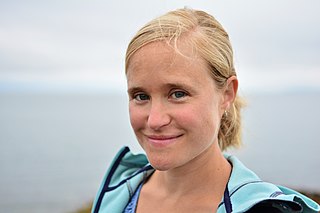
Sustainable development is an organizing principle for meeting human development goals while also sustaining the ability of natural systems to provide the natural resources and ecosystem services on which the economy and society depend. The desired result is a state of society where living conditions and resources are used to continue to meet human needs without undermining the integrity and stability of the natural system. Sustainable development can be defined as development that meets the needs of the present generation without compromising the ability of future generations to meet their own needs. It is interlinked with the normative concept of sustainability. UNESCO formulated a distinction between the two concepts as follows: "Sustainability is often thought of as a long-term goal, while sustainable development refers to the many processes and pathways to achieve it."
Industrial ecology (IE) is the study of material and energy flows through industrial systems. The global industrial economy can be modelled as a network of industrial processes that extract resources from the Earth and transform those resources into consumable energy products which can be bought and sold to meet the needs of humanity. Industrial ecology seeks to quantify the material flows and document the industrial processes that make modern society function. Industrial ecologists are often concerned with the impacts that industrial activities have on the environment, with use of the planet's supply of natural resources, and with problems of waste disposal. Industrial ecology is a young but growing multidisciplinary field of research which combines aspects of engineering, economics, sociology, toxicology and the natural sciences.

The Norwegian University of Science and Technology is a public research university in Norway with the main campus in Trondheim and smaller campuses in Gjøvik and Ålesund. The largest university in Norway, NTNU has over 8,000 employees and over 40,000 students. NTNU in its current form was established by the King-in-Council in 1996 by the merger of the former University of Trondheim and other university-level institutions, with roots dating back to 1760, and has later also incorporated some former university colleges. NTNU is consistently ranked in the top one percentage among the world's universities, usually in the 400–600 range depending on ranking.

The Norwegian Institute of Technology was a science institute in Trondheim, Norway. It was established in 1910, and existed as an independent technical university for 58 years, after which it was merged into the University of Trondheim as an independent college.

The Norwegian University of Life Sciences is a public university located in Ås, Norway. It is located at Ås in Viken, near Oslo, and at Adamstuen in Oslo and has around 5,200 students.
SINTEF, headquartered in Trondheim, Norway, is an independent research organization founded in 1950 that conducts contract research and development projects. SINTEF has 2000 employees from 75 countries and annual revenues of three billion Norwegian kroner. SINTEF has a close partnership with Norwegian University of Science and Technology (NTNU), started in 1950 when SINTEF was founded. SINTEF has expertise in technology, medicine and the social sciences. Alexandra Bech Gjørv is the CEO of SINTEF, preceded by Unni Steinsmo, Morten Loktu and Roar Arntzen.

The NTNU University Museum in Trondheim is one of seven Norwegian university museums with natural and cultural history collections and exhibits. The museum has research and administrative responsibility over archaeology and biology in Central Norway. Additionally, the museum operates comprehensive community outreach programs and has exhibits in wooden buildings in Kalvskinnet.
Ecological design or ecodesign is an approach to designing products and services that gives special consideration to the environmental impacts of a product over its entire lifecycle. Sim Van der Ryn and Stuart Cowan define it as "any form of design that minimizes environmentally destructive impacts by integrating itself with living processes." Ecological design can also be defined as the process of integrating environmental considerations into design and development with the aim of reducing environmental impacts of products through their life cycle.

Carl Haakon Waadeland is a Norwegian musicologist and jazz drummer, known from several bands and releases such as with Dadafon, Dum Dum Boys, Åge & Sambandet, Halvdan Sivertsen, Warne Marsh, Kenny Wheeler, Annbjørg Lien, Henning Sommerro, Bjørn Alterhaug, John Pål Inderberg, Knutsen & Ludvigsen, Mikis Theodorakis and Arja Saijonmaa. He was one of the driving forces behind the jazz program at NTNU which he also directed.

Helge Brattebø is a Norwegian chartered engineer. He is a professor of industrial ecology at the Norwegian University of Science and Technology.
The contributions of women in climate change have received increasing attention in the early 21st century. Feedback from women and the issues faced by women have been described as "imperative" by the United Nations and "critical" by the Population Reference Bureau. A report by the World Health Organization concluded that incorporating gender-based analysis would "provide more effective climate change mitigation and adaptation."

Nord University is a state university in the Nordland and Trøndelag counties of Norway. The university has 11,000 students at study locations in Northern and Central Norway, with main campuses in Bodø, the capital of the county of Nordland, and Levanger, a university town located on the south shore of the Trondheim Fjord. Further campuses are located in Mo i Rana, Namsos, Nesna, Sandnessjøen, Steinkjer, Stjørdal, and Vesterålen.

Rangeland management is a professional natural science that centers around the study of rangelands and the "conservation and sustainable management [of Arid-Lands] for the benefit of current societies and future generations." Range management is defined by Holechek et al. as the "manipulation of rangeland components to obtain optimum combination of goods and services for society on a sustained basis."

Sigurd Bergmann is a German-Swedish theologian and scholar of religion. He is a professor at the Department of Philosophy and Religious Studies of the Norwegian University of Science and Technology in Trondheim, and an alumni fellow of the Rachel Carson Center for Environment and Society at the Ludwig Maximilian University of Munich.

Nils Anders Røkke is a Norwegian scientist and business leader. He is the Executive Vice President Sustainability SINTEF. He is as of May 2017 the Chairman of The European Energy Research Alliance. EERA is the public research pillar of the EU Strategic Energy Technology Plan(SET-Plan). The SET-Plan aims at accelerating the development and market uptake of key low carbon technologies. EERA brings together more than 170 research centres and universities, working together on 17 joint research programmes, they build on national research initiatives.

Liette Vasseur is a Canadian biologist who has held the UNESCO Chair in Community Sustainability: From Local to Global in the Department of Biological Sciences since 2014 at Brock University in St. Catharines, Ontario, Canada. She is also a member of the Women and Gender Studies program and the Environmental Sustainability Research Centre. She is the President of the Canadian Commission for UNESCO.

Francesca Verones is a Swiss-Italian environmental engineer and Professor at the Industrial ecology programme at the Norwegian University of Science and Technology. Her areas of research are life cycle analysis, life cycle impact assessment and biodiversity analysis, and she is especially interested in aquatic and marine areas.

Helene Muri is a Norwegian climate scientist. She is a senior researcher for the Industrial Ecology Programme (IndEcol) at the Norwegian University of Science and Technology (NTNU), an interdisciplinary research programme specializing in environmental sustainability analysis. The programme aims to «provide high quality research and education in the field of industrial ecology for supporting the global community in realizing the Sustainable Development Goals.» Muri is also a researcher at SFI Smart Maritime. Her research interests include assessing the climate and environmental effects of various mitigation options in the maritime sector. She is a co-author in Working Groups I and III of the UN Intergovernmental Panel on Climate Change's sixth assessment report and is an adviser to the Standing Committee on Energy and the Environment of the Parliament of Norway.

Anders Hammer Strømman is a professor of industrial ecology in the Industrial Ecology Programme at the Norwegian University of Science and Technology (NTNU). He has collaborated with Francesco Cherubini in developing a method to analyse the climate impact of CO2 emissions from biomass combustion, and his fields of expertise include life cycle studies of producing electric car batteries.

Fredrik Jutfelt is a Swedish scientist. His field of study is animal physiology, and his current research focus is on the effects of warming and ocean acidification on the physiology and behaviour of fish. He is a professor at the Department of Biology at the Norwegian University of Science and Technology (NTNU) in Trondheim, Norway, where he is the leader of the animal physiology section. His research group is called the Jutfelt Fish Ecophysiology Lab, and they investigate how fish respond physiologically and behaviourally to changes in the environment. Much of the research is based on laboratory studies of zebrafish, and he has built a zebrafish research facility at NTNU. The research group also studies the impacts of climate change on marine animals.















